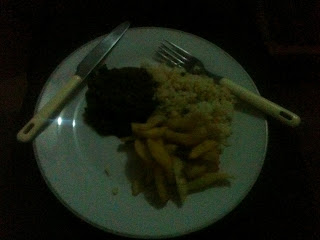For breakfast were the usual eggy-chapatis, and for once I had company. Albert's cousin sat watching me daintily trying to cut the plate-sized chapati with my knife and fork, without knocking it off the plate and onto my trousers.
We eat them like this. He took a chapati in hand, folded it in half, and half again, and bit into it like a slice of pizza. Now I knew.
I saw the boy after breakfast.
To go to the church? he asked. When the person who makes your food, washes your clothes, and polishes your shoes, asks this, I'm sure the only polite answer is
Yes? And I like to think that you get a lot more out of life when you say
yes to things. In fact, that was my answer the first time I was asked about coming to Rwanda:
Yes?
Getting to the church involved a fair bit of clambering down dusty dirt tracks, and jumping over ditches filled with old flip-flops and discarded vegetables. This experience is not unique to that route; most residential areas and footpaths (ie. not busy main roads without pavements) are like this. It makes me appreciate how privileged Albert is to live on a street with a surfaced road (and a pavement which the motos sometimes use because it's smoother than the road).
As soon as we arrived, I realised I was under-dressed. I hoped the novelty of being a muzungo would distract their attention from my terracotta chinos. At least I hadn't spilt eggy-chapati on them. We sat outside, under a stilted roof. It was a sort of linear amphitheatre, with rows of steps sloping down to the front. On each step was built a simple wooden bench. I sat, with the boy near the back until a roundish lady at the front started waving at me and we moved.
You are living with Ernest (one of Albert's cousins).
I am his colleague. He must have told her but I was still confused how she knew it was me.
You are very welcome, she said, a typical, friendly Rwandan greeting. I shook the hands of the starers around me and we sat to face the front; all except one child, who sat on the back of the bench in front, facing me, repeating the word
muzungo at me every few seconds. The whole service was in Kinyarwanda, but the lady next to me translated every now and then, whilst intermittently quizzing me:
Do you accept Jesus? Do you pray every day? Do you know the holy spirit?
I should say that this was an Adventist church, which is why we were there on a Saturday. It isn't something I know a lot about so I can't elaborate.
There was a choir, separated into two parts: those wearing lime green, and those wearing bright red. The lady limes wore green togas; whilst the men had much less conspicuous green ties. The red ladies wore red shirts with flaring collars, under white trouser suits; whilst the men settled with red collars and cuffs on white shirts. The service ended with a cheerful sounding song.
Its mean thank God for everything, the lady explained. She waved her arms passionately as she said
everything. Irrespective of the religious aspect, it was quite nice to see a group of people so appreciative of life, and the world around them. It made me think of how cynical we can be in England.
As the pastor closed the service, a boy, of apparently five or six years, ran up and touched my shoulder. His mother told him off and dragged him away.
He wants to take your hand. The child who had been saying
muzungo at me, in every noticeable silence - he could have been saying it throughout but I couldn't hear - had fallen asleep on his mother's lap.

















































